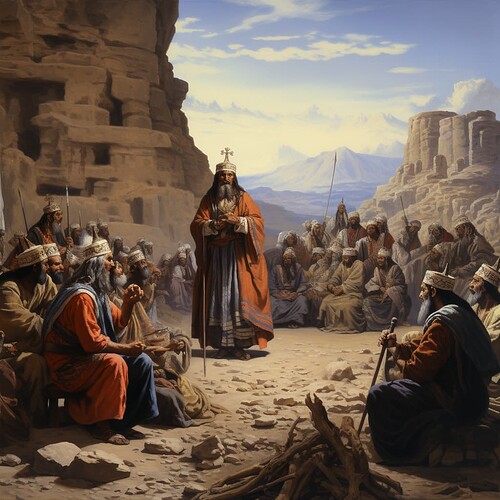Tracing the Legacy of Esau and the Edomites
 Introduction
Introduction
On January 21st, our reading journey takes us through Genesis 36, a chapter that details the genealogy and legacy of Esau, the brother of Jacob. This chapter provides insights into the lineage of the Edomites and sets the stage for understanding the complex relationship between Israel and Edom in biblical history.
 Genesis 36: The Descendants of Esau
Genesis 36: The Descendants of Esau
Genesis 36 outlines the generations that descended from Esau, detailing his wives, sons, and grandsons. It narrates the establishment of the Edomite tribes and leaders, showcasing a rich tapestry of family dynamics and tribal formations.
Key Verse: “These are the generations of Esau (that is, Edom).” — Genesis 36:1
 Key Themes and Reflections:
Key Themes and Reflections:
The Complexity of Family Legacies: The chapter reflects the ongoing impact of Esau’s choices and the diverse destinies of his descendants.
The Formation of Nations: Esau’s lineage is not just a list of names but represents the formation of the Edomite nation, a significant player in the region’s history.
God’s Sovereignty in Human History: The detailed genealogies underscore the belief that God is intimately involved in the unfolding of human history, even in lineages outside the chosen lineage of Jacob.
 Today’s Application:
Today’s Application:
Reflect on the impact of family legacies and how individual choices can shape future generations. Consider how understanding historical and genealogical contexts can deepen our comprehension of biblical narratives.
 Hidden Gem:
Hidden Gem:
Did you know? The mention of kings and chieftains among Esau’s descendants indicates a structured and established society, revealing the significance of Edom in the ancient Near East.
 Reflective Q&A:
Reflective Q&A:
![]() Genesis 36: The Lineage of Esau
Genesis 36: The Lineage of Esau
![]() Esau’s Legacy: What can we learn from the extensive record of Esau’s descendants?
Esau’s Legacy: What can we learn from the extensive record of Esau’s descendants?
A: The record of Esau’s descendants teaches us about the broader narrative of God’s dealings with humanity. It shows how God’s plan encompasses more than just the chosen lineage and includes diverse peoples and nations.
![]() Understanding Historical Contexts: How does knowledge of Esau’s lineage help in understanding the relationship between Israel and Edom in later biblical narratives?
Understanding Historical Contexts: How does knowledge of Esau’s lineage help in understanding the relationship between Israel and Edom in later biblical narratives?
A: Knowing Esau’s lineage provides context for the tensions and interactions between Israel and Edom, highlighting the deep-rooted familial and national ties that shaped their relationship.
 Join the Discussion:
Join the Discussion:
What insights do you gain from studying the genealogies in Genesis? Share your thoughts on the significance of tracing lineages in biblical narratives.
esau #Edomites #Genealogy #BibleStudy #GenesisReading
![]() See You Tomorrow in Genesis: Continue exploring the rich tapestry of biblical history as we journey through the book of Genesis.
See You Tomorrow in Genesis: Continue exploring the rich tapestry of biblical history as we journey through the book of Genesis.
 Join the forum!
Join the forum!
Engage in our AIgniteScripture Community for a deeper understanding:
Free Members: Join vibrant discussions and access a wealth of resources. Sign up here: 🌟 How to Join Page - Membership Options
Supporters Membership ($20/month or $200/year): Access in-depth newsletters, exclusive privileges, and shape our community. Become a Supporter: 🌟 How to Join Page - Membership Options
![]() Stay Updated with the AIgniteScripture Newsletter: Keep up with daily readings and insights. Subscribe here: https://newsletter.aignitescripture.com/
Stay Updated with the AIgniteScripture Newsletter: Keep up with daily readings and insights. Subscribe here: https://newsletter.aignitescripture.com/
